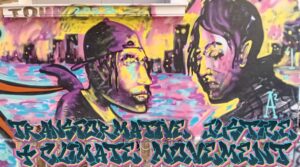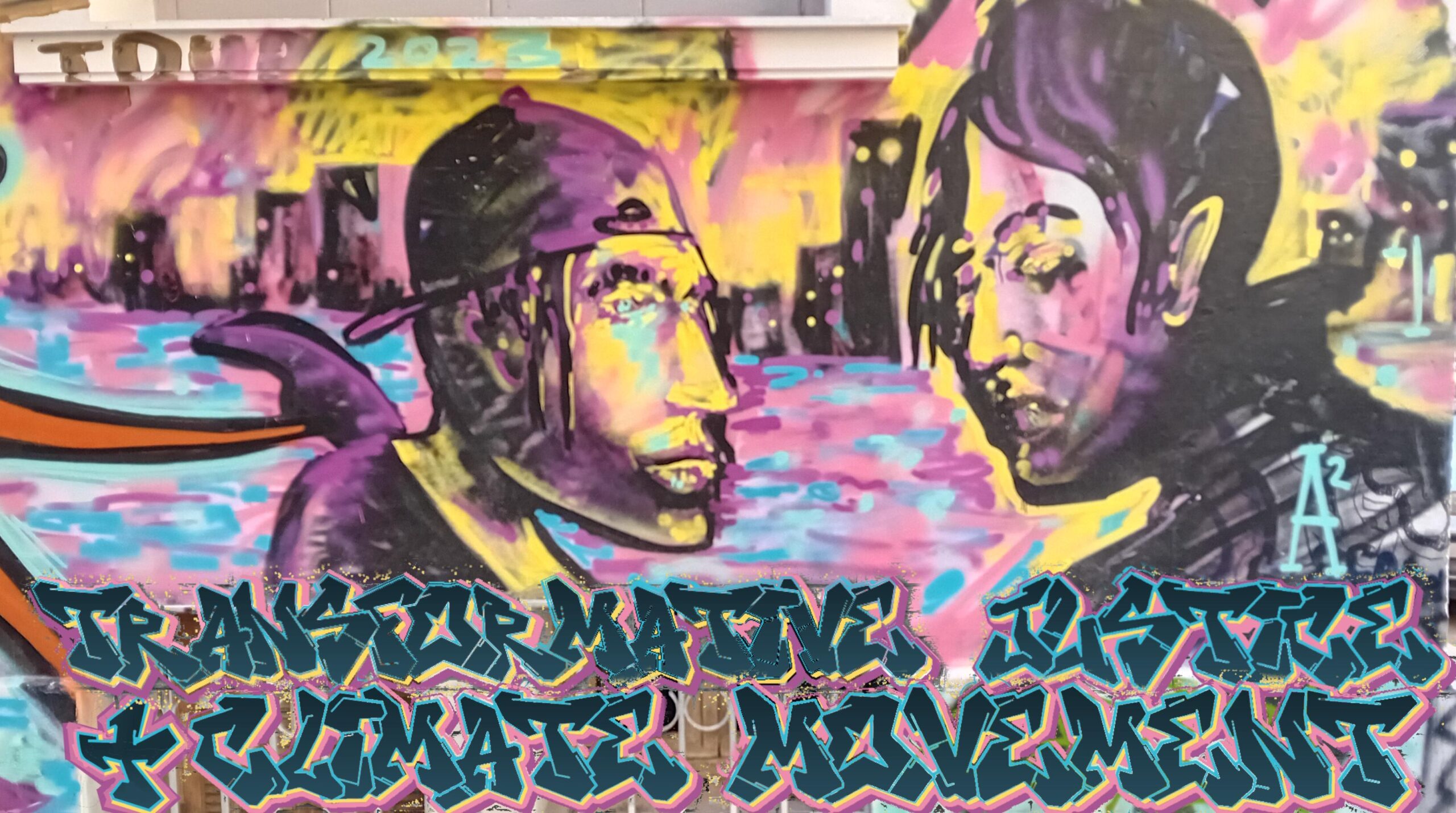Within the climate justice movement, we’re all about fighting for the planet, right? But sometimes we are so passionate, we end up fighting among ourselves. In our passion for shifting the cultural paradigm, we often end up cancelling our comrades, instead of taking the time to help each other to learn and grow our behaviors.
Recently I was listening to a book,‘Viral Justice: How we grow the world we want’, by Ruha Benjamin (2022), a Black, American, Sociologist who made the argument that cancel culture is not much different from the project of incarceration. When cancelling a person (not a company or personal brand), the person is punished with the isolation and exclusion from their communities, much like a prison sentence.
I can personally attest that being excluded or removed from your community can lead to BIG T trauma, while being surrounded and supported by your community had significantly reduce the impact of trauma and its long term effects.
So, if we are abolishing Prisons, and I think we definitely should, should we not also abolish the practice of cancelling people in our communities. Lets just keep it as the NVDA tactic that it should be. For a while, I’ve been mulling over the idea of how climate movement can adopt some of the practices from the transformative justice (TJ) play-book. Implement TJ as prefigurative action in our groups might even me more effective at achieving our goals than recycling and eating less meat. After all, there can be no climate justice without prison abolition.
I recommend also reading how this connection was also made by Adriane Maree Brown in her book ‘We will not cancel Us: and other dreams of transformative justice ( I am still waiting for this book to be available on audio through my library) and British organiser, Mikaela Loach, her book, ‘It’s not that Radical: Climate action to change the world’. These awesome authors can say it much better than I, a white person who is only just starting to learn about the subject, can. In fact, Adrienne wrote a blog about this and 3 steps for how we can practice TJ in our groups, back in 2015 that you should totally read first. Then come back to hear how, 8-9 years later, many in the Europe movement spaces are still fucking this up.
For the purposes of this article/blog/rant here is a brief introduction to Transformative Justice. TJ is a practice created by and for BIPOC, LGBTQ, people with disabilities, sex workers and poor and low income communities. The practice is built on traditions that have been used in these communities for centuries and re-imagined by the prison abolition movement as a way to resolve violence, harm and abuse that has occurred within communities, without involving state institutions (kops). To prevent the state from further perpetuating violence, which disproportionately threatens these communities. Instead the practice focuses on healing, accountability and harm reduction. It acknowledges that trauma often leads to more violence – ‘hurt people, hurt people’.

In my travels I have seen that conflict in various forms exists in every movement group. What differed vastly was the groups approaches to conflict (this also varies across different cultural relations to conflict, but was not always limited by cultural norm). The groups who ignored conflict and had no approaches for dealing with it were the most vulnerable. I have seen the charred remains of a tree house in a forest occupation as a result of a complete lack of conflict resolution process. Not that conflict is ever easy but if the group has already decided together how it will handle it when it inevitably arises, this at least creates a security understanding of what will happen when it does.
From what I observed of German culture is that, much like my family, they avoided speaking about conflict and emotions, like I wish people avoided COVID-19. And, much like my family, this can mean not talking to people for years to avoid having a difficult conversation.
In one occupation in Germany I was extremely surprised to learn that they had no policies or procedures in place for conflict resolution. I heard before and after I visited the site that conflict has been an issue that has infected the relations there for years. This conflict spilled over into a training camp I was attended and despite the years of experience the facilitators had no tools to offer to help the participants navigate that conflict.
However, in the German climate camps there was always an awareness group, with their own pre-published, awareness policy, around issues such as, privilege, discrimination, consent practices, boundaries and practices for how we can live together as a community. This policy attempts to create safe(r) spaces for people to prevent conflicts from occurring. There were volunteers available to support with a variety of interpersonal issues and empower those who have experienced discrimination or harm to find a solution that they are comfortable with. I did not have an opportunity to witness which kinds of solutions were suggested, but I know that out right canceling and public calling out was still one of them.

Beyond the climate justice movement other groups are also working on how to resolve conflict in their groups. The brief time I spent with some Italian groups revealed that many people were dedicating their quite time to researching transformative justice and other communication based practices to be able to support their affinity groups through their current conflicts. But the groups had yet to implement any policies.
In contrast, the Greek culture and movements that I experienced were the best at acknowledging the inevitability of conflict and not attempting to avoid it. This meant that they already had the procedures and practices in place to work through conflict together. Where I stay in a large community squat for three months in Athens it was common practice to invite someone to have a conversation about an issue as soon as it arose, to avoid misunderstandings and building resentments. When issues could not be resolved in these conversations, some other responsible people from the community would be invited to join to help to resolve the issue. When the issue turned to conflict it was brought to the whole community to discuss in one of the weekly meeting. The people were asked to put their conflict forward within the framework of the community to be discussed as a political rather than a personal topic (at least in theory). In a community of 300+ people and new people visiting all the time this often meant the assemblies would go for 10 – 13 hours. The topics that were considered important would be discussed until a resolution could be found.
Within this group we also practiced taking radical responsibility for our own actions and feelings rather than waiting for others to call us out. In this practice we would name the behaviors, where we think they stemmed from and how we aimed to work on them in the future. For example, one issue that came up for me was often feeling left out when I was too embarrassed or shy to ask for translation. Rather than blaming others for this, I was encouraged to look to how I could change my own behaviors, like speaking up when I didn’t understand, to have agency over my own happiness. This practice of taking responsibility for your own feelings rather than blaming others behaviors also reminds me of the practice of Relationship Anarchy, which also has some great suggestions for how we can be in relation with others, not just with our romantic or sexual partners but with every one.
Also in Athens, I attend a Care in Movements workshop, over four evenings, at the Feminist Autonomous Centre for research (FAC). To attend this workshop we all have to agree with the collectives Code of Contact first. This code code outlines their approach to how they want to be in relation with each other and conflict resolution practice. It is based on learnings from Black, Trans Feminist Collectives and Transformative Justice. They begin by stating that;
“We understand that discomforts, tensions, disagreements and conflicts come with all relationalities; we believe these are an opportunity to deepen relationships and discover wisdom for our collective growth and social transformation.”
The code as written not as a hard and fast rule but as a place to begin conversations from. It acknowledges that we have all internalised harmful behaviors and ways of thinking under the current racialised, capitalist and hetero-patriarchal systems. And that we must support each other to unlearn these behaviors. It outlines their values, boundaries and hard limits and invites people to lean into the difficult feeling that come from speaking up and being called in on your behavior rather trying to avoid these emotions. They also outline their restorative process, and state that;
“…we are committed to the idea that conflict belongs to community, and that we are all respectively resourced and capable of being “feedback friends” and “conflict advisors” who can support those impacted by harm as well as those who may have caused it, by supporting conversations and facilitating conflict transformation processes.”
I love that the process advocates for calling people in, rather than out, and supports all parties to grow and learn together from the experience. The code goes into more detail on how this process is imagined and lots of recommended resources to dive deeper into the topic. I highly recommend reading it.
The radical action of leaning into the conflict, acknowledging and embracing the fact that it is natural part of all our interactions no matter how much we care for each other is very inspiring. This will definitely be more challenging for some cultures than others but the point is that wee can all be supported and work together to learn how these approaches can work for our affinity groups and communities.

My own interest in this topic stems from being called out on my own bullshit behaviors, as a person with C-PTSD this sadly an all to common experience for me, but with no one around to support our guide me to take accountability and learn from my actions I have lost friends and communities and had to try attempt to unlearn these behaviors alone while experiencing the deep grief of those loses. I am committed to attempting to doing this learning now, but I know in my younger years when this happened I would just say ‘fuck you then’ and was not open to taking any accountability for my role in that relationship break down. If I had been in then movement then it may have even spelled the end of my commitment to the struggle.
It is for this reason, I advocate strongly for finding ways to lean into the uncomfortable experiences that come from being in relation with others and to embrace the moments of friction as a moment that we all have an opportunity to learn and grow from. To implement transformative conflict resolution practices for the resilience of the movement and as a blueprint for how we can build a better society for the future.
Links
https://www.ruhabenjamin.com/viral-justice
https://adriennemareebrown.net/2015/07/09/what-isisnt-transformative-justice/
https://www.ende-gelaende.org/en/awareness-concept-info-system-change-camp-hamburg-2022/
https://log.andie.se/post/26652940513/the-short-instructional-manifesto-for-relationship
https://log.andie.se/post/26652940513/the-short-instructional-manifesto-for-relationship
